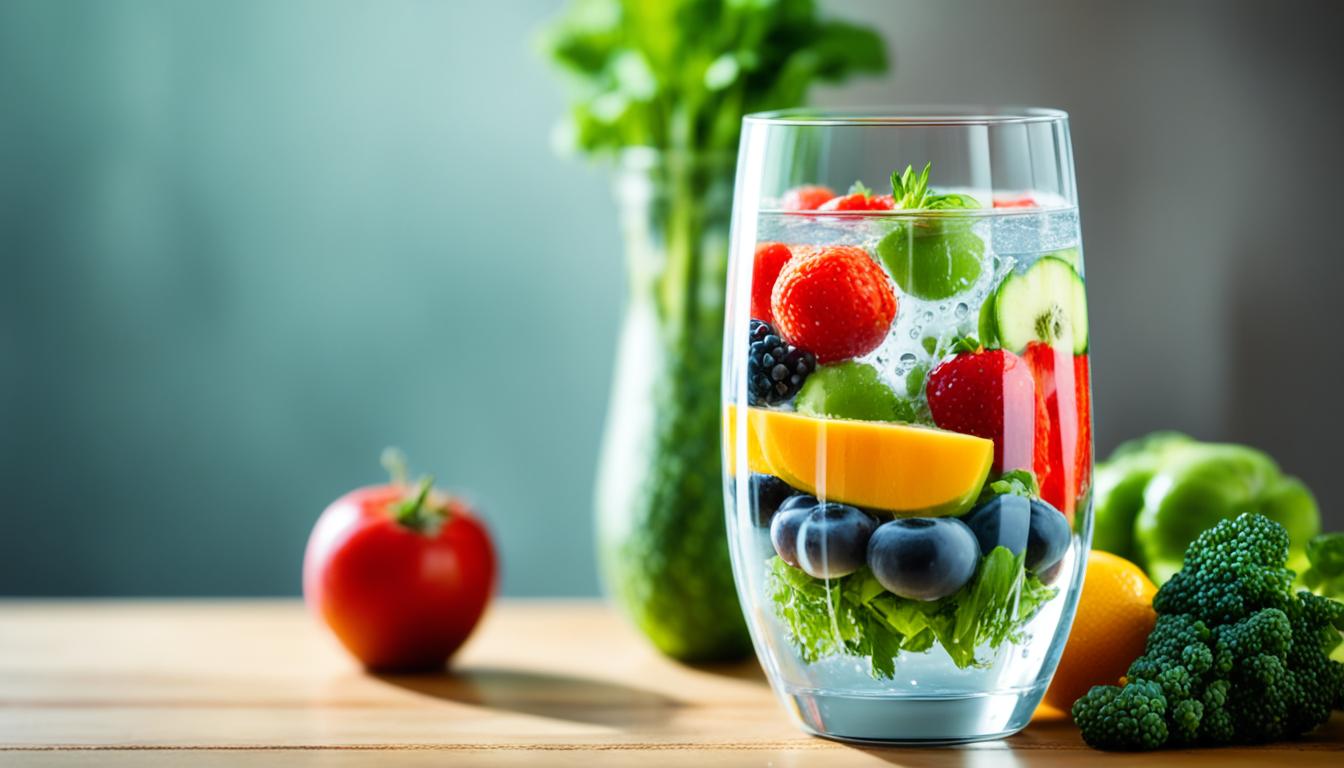Embarking on the journey to weight loss often leads individuals to explore a variety of successful weight loss strategies, among which is the idea of hydration for weight loss. The concept of sipping water before meals, often referred to as the water diet for weight loss, has stirred significant interest and debate. Does loading up on H2O truly make a difference on the scale, or is its reputation merely a drop in the ocean of weight loss tips?
Key Takeaways
- Increased water intake may create a sense of fullness, potentially aiding in weight management.
- Drinking water before meals can suppress appetite, offering a simple strategy to curb calorie intake.
- Integrating water into a broader weight loss plan can contribute to successful weight management.
- Hydration for weight loss should be viewed as one component within a multi-faceted approach to healthy living.
- Debates persist, but water consumption, when combined with diet and exercise, may enhance weight loss efforts.
The Role of Hydration in Weight Management
The intricacies of weight management extend beyond diet and exercise, venturing into the realm of hydration. Understanding the relationship between water intake and weight management could be key to enhancing our approach to shedding pounds. The benefits of drinking water before meals are not only a matter of quenching thirst but also about making strategic moves toward achieving a healthy weight.
How Water Impacts Digestion and Muscle Function
Findings highlight the significance of hydration in digestion and muscle function. An optimally hydrated body can digest food more efficiently, ensuring that nutrients are absorbed and waste is expelled. Water acts as a lubricant in the digestive system, facilitating smoother bowel movements, potentially reducing issues like constipation. In the realm of muscle performance, water is the foundation for muscular flexibility and strength, impacting everything from workout efficacy to daily physical tasks.
Understanding the Feeling of Fullness
Many seek the feeling of satiety without additional caloric intake, and this is where water steps into the spotlight. By occupying space in the stomach, water intake before meals can create a sense of fullness, which may prevent overindulgence and help control caloric consumption, further asserting the benefits of drinking water before meals for weight management.
The Correlation Between Water Consumption and Weight Loss
Substantial research suggests a correlation between increased water consumption and weight loss. Empirical data reveal that adequate water intake before meals could contribute to reduced overall calorie intake, subsequently aiding in weight reduction. Furthermore, this practice may bolster the body’s resting energy expenditure, implicating that water’s role might extend to temporarily boosting caloric burn.
| Benefit | Impact on Weight Management |
|---|---|
| Digestive system lubrication | Supports efficient digestion and waste removal |
| Feeling of Fullness | Reduces hunger and caloric intake |
| Resting Energy Expenditure | Potentially increases calories burned at rest |
In summary, while not a solitary solution, integrating a strategic water intake routine before meals may provide tangible benefits in the quest for weight management.
Does drinking water before meals really help you lose weight?
There’s a wave of individuals committed to their weight loss journeys, many of whom are exploring innovative, yet straightforward strategies. Among these strategies is the simple act of hydrating oneself effectively with the aim of managing weight. The question arises—could something as accessible as water be a key to unlocking weight loss success? Is the act of drinking water to curb appetite just a myth, or is there truly substance to this approach?
Several studies suggest that drinking water before meals may contribute to weight loss. One particular study has shed light on the potential benefits of this practice. Overweight females who consumed around 500 milliliters of water half an hour before eating were observed to not only drink more water lose weight but also experience a notable reduction in body fat and appetite levels. This evidence indicates that the glass of water taken before meals could be a practical measure for those aiming to reduce their food intake.
- Reduces the likelihood of overeating by creating a feeling of fullness
- May help to distinguish between actual hunger and thirst
- Reinforces the habit of mindful eating and portion control
In the light of these findings, promoting increased water intake as part of a comprehensive weight loss strategy seems viable. Whilst not a standalone solution, when individuals drink more water lose weight can potentially be a pleasant side-effect of being hydrated. However, it is important to recognize that this does not guarantee weight loss for everyone—as individual results may vary based on numerous personal factors.
Water preloading before meals can lead to moderate weight loss and reduced appetite in some individuals. – Study on Water Consumption and Weight Loss
Furthermore, drinking water alone does not equate to a substantial lifestyle change; it is merely a contributor to the broader array of measures necessary for healthful weight management.
| Pre-Meal Water Intake | Benefits for Weight Management |
|---|---|
| Creates sense of fullness | Reduces overall calorie consumption |
| Hydrates efficiently | Enhances metabolism and digestive processes |
| Replaces high-calorie beverages | Cuts unnecessary liquid calories |
To traverse the weight loss path with hydration as a guiding light, the key is balance and integration into a healthy lifestyle. The practice of drinking water to curb appetite might just be a stream leading towards the larger ocean of wellness and achievement of weight management goals.
Analyzing the Science: Water’s Effect on Caloric Intake
The science behind staying hydrated for weight loss delves into the biological responses our bodies have to water consumption. As we dissect the impact of water on our eating habits and metabolic rate, a clearer picture begins to emerge. Supporting a weight loss strategy with adequate water intake may offer more benefits than just kicking thirst to the curb.

The Impact of Water on Appetite Suppression
One of the pivotal roles water plays in weight management is its potential to suppress appetite. By consuming water, particularly before meals, individuals may promote a sense of satiety. The benefits of drinking water before meals include occupying space in the stomach and possibly signaling to the brain that less food is required to feel full, thereby aiding those staying hydrated for weight loss.
Water Intake and Its Temporary Boost to Metabolism
Moreover, the temporary metabolic boost that drinking water provides shouldn’t be overlooked. Cold water, for instance, requires the body to expend energy to heat it to body temperature. This phenomenon may lead to a slight increase in calorie burning that, while modest, can complement other weight loss efforts over an extended period.
Studies on Pre-Meal Water Consumption and Reduction in Calorie Intake
Empirical evidence supports the notion that pre-meal water consumption can effectively reduce calorie intake. Scientific studies have observed how drinking water before eating leads to a reduction in the number of calories consumed during meals. This response could help tip the scales in favor of weight loss for those making a conscientious effort to reduce their calorie intake.
Drinking water before meals can encourage a lower intake of calories and potentially aid in weight management.
While water consumption before meals shows promise in the context of weight management, it is essential to recognize it as part of a more comprehensive approach. Ultimately, staying hydrated may be a useful tactic in achieving weight loss goals when combined with a balanced diet and routine physical activity.
Hydration for Weight Loss: More Than Just Water Intake
Embarking on successful weight loss strategies often involves more than just careful meal planning and exercise routines—one must also pay careful attention to staying hydrated for weight loss. Hydration plays a multifaceted role in supporting weight loss efforts and can come from various sources, not just by gulping down water. Let’s explore some alternatives to water for keeping your body hydrated, dispel myths about water temperature and weight loss, and highlight high-water-content foods that can be beneficial to your diet.

Alternatives to Water for Staying Hydrated
For individuals exploring hydration options outside of traditional water consumption, several alternatives can contribute to your daily fluid intake. Swapping sugary beverages for diet soda or green tea can add a burst of flavor without the additional calories. Moreover, those accustomed to the energizing effects of caffeine will find coffee to be hydrating, contrary to the popular myth that it dehydrates you. Diverse choices like these can make staying hydrated for weight loss both enjoyable and effective.
The Myth of Temperature and Weight Loss
The belief that the temperature of drinking water can pivotally influence weight loss has been widely contested. Although science acknowledges slight caloric expenditure due to the body warming up cold water, the effect on weight management is minimal. How you choose to enjoy your water—ice cold, lukewarm, or steaming—should hinge on preference rather than the pursuit of a weight loss edge.
Choosing Foods with High Water Content
Did you know that certain foods can significantly contribute to your water intake? Integrating water-rich food items such as fruits, vegetables, and broth-based soups into your diet serves a dual purpose. These foods not only keep you well-hydrated but can also enhance satiety without loading up on calories—aligning perfectly with successful weight loss strategies. Below is a table that illustrates the high-water content present in a variety of foods, making them excellent choices for those wishing to stay hydrated while cutting back on calories.
| Food | Water Content | Calories |
|---|---|---|
| Cucumber | 95% Water | 16 per 100g |
| Tomatoes | 94% Water | 18 per 100g |
| Watermelon | 92% Water | 30 per 100g |
| Strawberries | 91% Water | 32 per 100g |
| Broth-based Soup | Variable | Variable |
Incorporating these natural, hydrating options into your daily intake not only supports a hydrating regime but also encourages nutritious eating habits. Ultimately, these strategies can contribute to a successful path towards weight loss, proving that hydration for weight loss is more than just about plain water intake—it’s about making hydration choices that support your overall health and weight loss goals.
Debunking Myths: Water Consumption and Weight Loss Misconceptions
In the quest to shed pounds, many individuals latch onto simplified weight loss tips that suggest a direct correlation between increased water intake and significant weight loss. While hydration is undeniably crucial for overall health, it’s imperative to sift through the prevalent misconceptions clouding the reality of its effects on weight management. Contrary to popular belief, water is not a magical ingredient that melts away pounds; rather, it’s a component of a holistic approach to wellbeing.
Take the pervasive myth of the “eight 8-ounce glasses of water per day” rule—a guideline that has been recited by many but lacks substantial scientific support, especially in the context of weight loss. While the idea of drinking plenty of water is, in general, sensible advice for maintaining hydration, it is not the sole pathway to weight management success.
Moreover, the belief that choosing cold water over room temperature can maximize calorie burning is another example where the actual impact on weight management is greatly overstated. Though the body uses a small amount of energy to heat ingested cold water, the calorie difference is minimal and unlikely to contribute significantly to weight loss goals.
An appreciation for hydration’s true role in weight management involves understanding that it is an aid, not an answer. Proper water intake for weight management ideally complements other essential components such as a balanced diet, regular physical activity, and an understanding of personal caloric needs.
As we address these misconceptions head-on, it becomes apparent that effective weight loss is not about a single fix or an isolated practice but about integrating various sustainable lifestyle changes. Among these, staying hydrated plays an important part—not as a magical solution, but as one piece of a larger puzzle that, when completed, forms a picture of overall health and wellness.
Hydration should be viewed as a valuable partner in a broader strategy for weight management, rather than an isolated tactic yielding significant weight reduction on its own.
With this in mind, the following are tips to effectively incorporate water and hydration into a larger weight loss plan:
- Choose water or low-calorie beverages over high-calorie options to help reduce overall caloric intake.
- Drink water throughout the day to support satiety and potentially reduce unnecessary snacking.
- Incorporate water-rich foods such as fruits and vegetables into your diet for added hydration and nutrition.
- Integrate water intake with other proven weight loss measures, such as increased physical activity and mindful eating practices.
In conclusion, while water can support weight loss efforts by helping with satiety and possibly impacting metabolism, it should always be viewed as part of an integrated approach to healthful living. Recognize hydration’s place in a balanced diet to confidently chart a course toward sustainable weight management, and employ water intake for weight management wisely—allowing science and a holistic perspective to be your guides.
Conclusion
In assembling the puzzle of weight management, integrating the benefits of drinking water before meals can act as a beneficial piece. While it’s not the ultimate elixir for shedding pounds, staying adequately hydrated forms a cornerstone within successful weight loss strategies. Water, when consumed before meals, may increase feelings of satiety and even offer a slight boost to metabolism, thereby helping with caloric control—a key to weight loss.
However, it’s vital to acknowledge that effective weight management comprises a tapestry of components, tailored to individual needs. As we review various weight loss tips, it becomes evident that the inclusion of water should be just one aspect of a balanced approach, encompassing a nutritious diet and consistent exercise regimen. Each person’s journey is unique, calling for an understanding of personal hydration requirements and how it fits within one’s overall lifestyle choices.
To navigate the intricate waters of weight loss, one must consider hydration as an ally in a broader strategy, alongside mindful nutritional choices and physical fitness. By doing so, you can enhance your path toward achieving and maintaining a healthy weight, underlining the idea that, while water may not single-handedly command weight loss, it remains a vital contributor to overall health and well-being.




